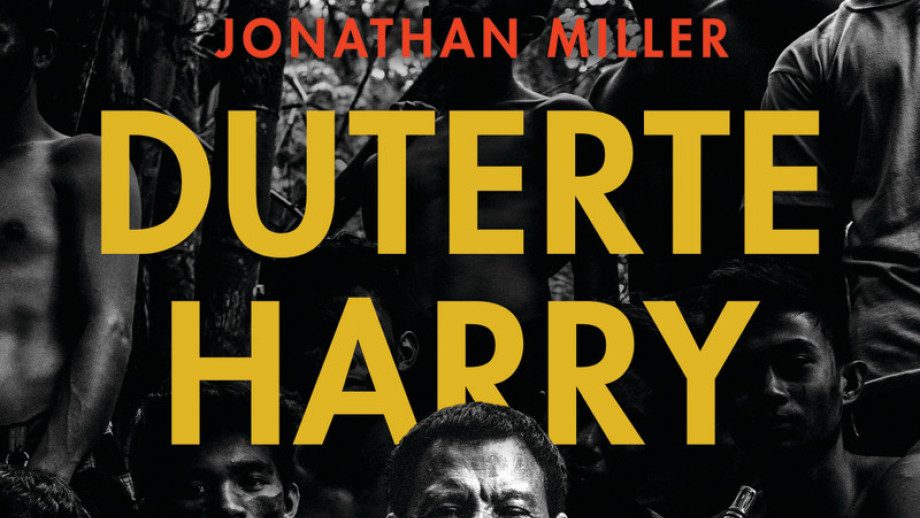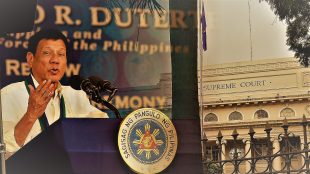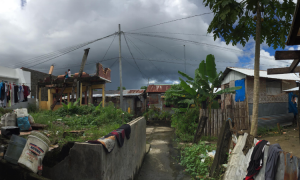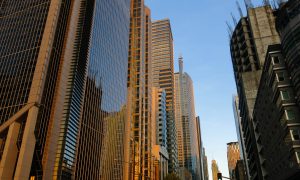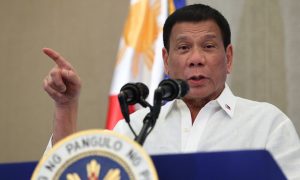Editor’s note: Our Philippines editor Nicole Curato talked to Jonathan Miller, the author of Duterte Harry: Fire and Fury in the Philippines, after the book’s Canberra launch at the Australian National University on 31 May. See below for a transcript.
Nicole Curato (NC): Hello. We’re in conversation with Jonathan Miller, the author of the first biography of Philippine President Rodrigo Duterte here at the Australian National University. I’m Nicole Curato, the Philippines Editor of New Mandala. Thank you, Jonathan for granting us this interview. Very exciting book.
Jonathan Miller (JM): Thank you.
NC: Well, you’ve covered a lot of, I would say, strongmen, not just in Southeast Asia but also in the Middle East and other parts of the world. What made you particularly interested with the Philippine President Rodrigo Duterte enough to write a biography about him?
JM: Well, it was a combination of circumstances. I mean Duterte’s rise to power coincided with my own arrival back in Southeast Asia as a correspondent for Channel 4 News in the UK. And he arrives sort of like this great force from the south. He exploded into the political arena and immediately raised eyebrows and grabbed attention and headlines. You know, he used forcefully bad language, he swaggered with this gangster charm of this into the political arena. And you know, journalists took notice. He called the Pope a son of a whore, he called Obama a son of a whore. And then he started killing people.
And you can’t not take notice when somebody starts killing people at that pace. So within I think the first 3 or 4 months in power, he’d managed to kill more people than Marcos managed in a decade of martial law. So you know I watched this happen, I went over to the Philippines on two occasions in those early months and encountered him in his own fiefdom in Davao. And on one of these occasions when I asked him a question about death squads and human rights, he went nuts at me and you know called me a son of a whore, a putang ina as well. So I joined the ranks of the Pope and Obama and that’s cool.
NC: It must be a badge of honour. (laughs)
JM: It’s a badge of honour to some degree but it wasn’t like it was personal but you know I felt personally engaged in the story. I was really interested in it from that point of view. Because you know personality-wise, he was a big character. He definitely had—although he’s got this sort of slouchy sort of Putinesque sort of way of behaving, he’s also got a definite charisma and I was fascinated by him as a person but I was also fascinated in him as a strongman and I realized that after 30 years, the Philippines had forgotten what it was like to live under a dictator.
Thirty years is a long time. It’s more than the median age of most people in the Philippines. And so you know all these memories of Marcos and martial law and killings and imprisonments and human rights abuse and Imelda’s shoes (laughs) you know, it was all forgotten! Well, not all forgotten but it was fading fast. And here was a guy who made Filipinos proud to be Filipinos because he had cojones and he sort of stood up and said we felt—he didn’t feel like that old corrupt elite of the past. He offered something new, he condemned an imperial Manila and said, “I’m your man from the south.” And he always cast himself as a sort of like a saviour of the Philippines, a political saviour and in this persona that he’d cultivated of Duterte Harry, which was—you know, I get credited with a funny title. It’s not me, that was one of the terms he was called because it’s this sort of like vigilante cop who wants to save the universe but does it in a pretty underhand, violent way.
NC: And you did mention in the book that PDiggy didn’t quite catch attention because it doesn’t match the persona. But I think that’s the part that really interests me as a sociologist as well because you were mentioning in the book launch earlier that when he makes a joke about rape or when he says, “Son of a whore!” to the Pope, people laugh and there’s a response to it. What do you think accounts for that?
JM: Well, I think it’s… (laughs) he’s saying words which politicians don’t normally say and people kind of liked the fact that here was a guy who spoke this sort of down and dirty, salty language. It was spicy, it was fun, it was different. And he said it straight. And I think that gave him this sort of very rough-edged appeal. But as the book points out, it, like many other things about Rodrigo Duterte, are entirely contrived if not a straight lie because this guy was not a street kid from Davao. He wasn’t a—he didn’t come from a poor family. He was the son of a governor who had immense privileges. He was a spoiled brat who had his own bodyguards and it was from them that he learned to speak street talk.
NC: I think I just want to go back to your comments about the language. Obviously, that captured a lot of people’s imagination. But one of the debates going on in the Philippines now is how the journalists, especially international journalists, cover Duterte. Because it feels like there is a lot of attention on the language which kind of is distracting. It diverts attention to the real issues that the Philippines is facing. What’s your take on that?
JM: Agree. And it’s Duterte’s fault. I mean he revels in the coverage he gets of his bugoy ways, his hoodlum style. But actually, you’re absolutely right. You know, there are immense problems in the Philippines which you don’t need a sort of visiting Western foreign correspondent to point out, you know it’s an incredibly unequal society. The poverty is extreme. I mean some of the slums that I’ve visited were—there were victims of his drug war, were among the poorest places I have ever been. And you know, this is a country which desperately needs massive investment in infrastructure, in roads and railways.
And actually, to be fair, Duterte, with his Dutertenomics, has promised—albeit with loans from China and Japan which will take maybe decades to pay off—he has promised investment and infrastructure. But it was Prospero Nograles, his old political rival and former Congress Speaker, he’s a Davao politician too and Prospero Nograles said to me, “Look, when he was mayor of Davao—” let’s put it like this, he wasn’t known for his infrastructure projects. Duterte Harry was known for the… for the actions of his violent death squads in dealing with the problems of crime and drug addiction in Davao. And that what he’s brought to Manila and that what has become his signature policy. And that what has grabbed attention and distracted from these other things.
NC: You quoted The Handmaid’s Tale in the introduction of your book and I think it’s very striking when you did quote the line about how people work on their ignorance. It’s not something that is just passive. People really deliberately look the other way. Have you noticed similar patterns in the other stories that you’ve covered outside the Philippines? Because I think my curiosity here is how does it end? Are we just witnessing a cruel society that just lets their commander in chief murder people?
JM: No, no. And I would never, ever seek to lead people to think that I’m passing any form of judgment on the people of the Philippines. In the way that Margaret Atwood wrote in The Handmaid’s Tale, it was—this was a dystopian picture she painted of society. It could happen anywhere.
You know, we’ve had dictators emerge throughout history from different corners of the world. It’s a blemish of humankind. It’s not any one particular race, it’s a character-driven form of nastiness which you see in everyone from Hitler to Idi Amin and you see in the world today with populist authoritarians like Trump or Erdogan or Modi or Xi Jinping or you know Viktor Orban in Hungary. These are people who fuel other—their electorates’ fears with the politics of anxiety and hatred. And they target a particular strata of society and in Duterte’s case it is drug addicts and dealers and that hatred is focused on them but it’s not—you know, it’s about this narcissistic, misogynistic, violent man who’s described by the clinical psychiatrists whose observations informed the annulment of Duterte’s own marriage. You know, these are his character traits. It’s not a Filipino trait.
NC: As one of the priests you quoted in the book, “This is the worst of the Filipino.” Right? That is embodied by unfortunately the president. But I’m glad you mentioned that this is not unique to the Philippines and this can happen in any society because I anticipate that one of the criticisms against the book would be it’s so exoticizing. When you use the subtitle, “Fire and Fury in the Philippines” it’s kind of reminiscent of the Trump White House, right? So how would you address those critiques? That you know it’s painting a picture of a banana republic, a very exotic country—
JM: Oh, no, no. Fire—I mean no, look. The book does not paint a picture of a banana republic. I recognize the Philippines as Asia’s oldest democracy. This is a country which has had… you know, yes centuries of colonial misery under Spanish priests and then by the Americans for 50 years before independence. During which time you know or slightly before was rummaged by the Japanese very cruelly. And you know what a terribly sad and violent history the Philippines has had and this character is part and parcel of what emerged from all of that. But the Philippines is certainly no banana republic. It’s a sophisticated society, an educated society. And I met some of the finest journalists and politicians I’ve ever met in any of my reporting anywhere in the Philippines. What has happened though is under Duterte, he has subverted and attacked the core democratic institutions which make the Philippines a sophisticated society. He’s attacked the judiciary, he owns the military, he owns the police and turned them into a killing machine. He’s jailed his critics. He owns Congress. He—you know, he’s attacked the media, anybody who attacks him. These are the pillars of democracy. And it’s him who has undermined that and if anything, it’s him—it’s Duterte who’s responsible for anything that might be compared to a banana republic because he’s turning into one himself!
NC: You’ve covered a lot of strongmen in the past and how do you think this situation will end in the Philippines? Is this just a blip? Some people would say that the Philippines is on the road to authoritarianism, others are saying it’s just the zeitgeist of the moment, you know? You have the rise of the strongmen but eventually democracy will prevail. What’s your forecast?
JM: Well, I’d love to be optimistic but right now I don’t feel optimistic. I was struck by the words of Walden Bello, political analyst, former congressman who described Duterte as being like, “L’état, c’est moi” and he called him a fascist original. And I thought that was really striking. I think Duterte is a really authoritarian, anti-democratic force who wants power, has proved that he can manipulate democratic politics in the way that he did when he was mayor of Davao for 22 years and retained the governance of that city within his family and that remains the case today. I don’t see Duterte as wanting to give up power any time soon no matter how much he goes on about whether or not he’s going to survive his 6 years in office or whether he’s ill or whatever. I don’t think he is ill. I think he’s wanting to see what vultures start circling and who’s after the top job. And I suspect that having fired his Supreme Court judge essentially, or the Chief Justice of the Supreme Court, he will find a way to subvert the judiciary to the point that he can amend the Constitution at will and change it to his advantage.
NC: I guess in conclusion, of course, books take a life of their own. Authors don’t have control over how people will interpret the book, but I guess for people who are reading about Duterte for the first time, what kind of perspective do you want readers to take when they start opening the first page?
JM: Well, I mean I’m a journalist. I’m not an academic, I’m not a lawyer. I come to this book like a journalist who likes a good story and a strong top line. Duterte provided that in spade loads. This guy is good copy, there’s no doubt about it. And you know what my editors in London would say to me, “Oh, more Duterte! More Duterte!” It was nice to be able to provide good storytelling but you know my friends in the Philippines, the people who informed this book, whose voices I quote but can’t quote them by name because I’m so scared for their safety, these people—and some—I also talked to many, many friends, colleagues, associates, family members of the Duterte clan, all of these people came to inform this book.
We should worry that the impeachment of the Philippines' chief judge signals a new phase in the sidelining of Duterte critics.
Dismantling a liberal constitution, one institution at a time
And I would like to think that it goes beyond a simple… sensationalist attempt to… capture the first 2 years of this extraordinary presidency. I would like to think it provides answers as to why this man is the way he is and also will provide some perspective on how things might go because I personally think that the one word that you cannot apply to Duterte is unpredictable because if you look at his past, it’s perfectly possible to predict what he’s going to do in the future by looking at what he did in the past.
NC: What a powerful reminder. I think we can end it there. Thank you so much, Jonathan!
JM: Thank you so much, Nicole.
 Facebook
Facebook  Twitter
Twitter  Soundcloud
Soundcloud  Youtube
Youtube  Rss
Rss 